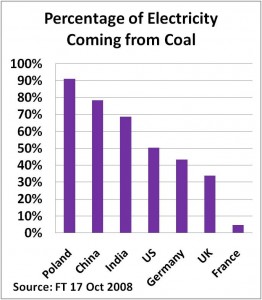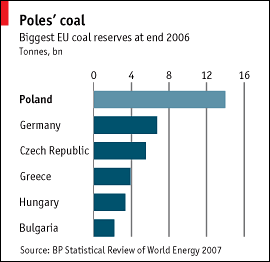The Future of Climate Policy Depnds Upon A Single Country . . .
October 20th, 2008Posted by: Roger Pielke, Jr.
In the coming weeks a monumental decision will be made that will influence the future evolution of global climate policies. A single country has in its power the ability to alter the course of global negotiations and change the dynamics of a political debate characterized by gridlock. That country is . . .
Poland. Yes, Poland. (It is not the U.S. presidential election.) Over the next 6 weeks, the EU, with France taking the lead, must convince Poland (plus other Eastern European countries and Italy) to fall in line with (i.e., not veto) its ambitious climate policies or else see them utterly fall apart. The following graph helps to explain the political dynamics.
Poland depends heavily on domestic coal for its energy needs, and thus its energy supply is very secure. France, by contrast, does not depend on coal, hence leading the charge on EU climate policies fits well with French national interests. For Poland, reducing dependence on coal all but certainly means a greater reliance on gas, which is most readily available from a large country to the east that Poland does not wish to depend on. The graph below from the Economist shows why Poland likes coal so much.
What will get Poland’s (and others in its coalition) vote in support of the EU’s climate policies? I can think if three possibilities:
1. Kick the can down the road. In exchange for Poland’s agreement to sign on to an aspirational agreement, the EU always could promise an escape clause in coming years.
2. Promise cost certainty. In exchange for the Polish vote, the EU could agree to limit the effects of any agreement on the Polish economy and energy security. This would basically carve out Poland from the EU policy.
3. Promise coal with CCS. The EU could promise to allow Poland to continue to rely on coal, and offer support for prototyping and deployment of new technologies to capture and store carbon dioxide from coal. The EU is fast heading down this path in any case.
It is clear that the EU cannot allow its climate policies to be seen to fail, while at the same time Poland is not going to abandon its domestic energy policies. As the Polish Prime Minister said recently:
We don’t say to the French that they have to close down their nuclear power industry and build windmills. Nobody can tell us the equivalent.
The future of climate policy awaits the resolution of the EU standoff.


October 20th, 2008 at 8:29 am
“It is clear that the EU cannot allow its climate policies to be seen to fail…”
Why not? What harm comes to Europe if there climate policy is abandoned or dramatically reduced? Economically they will be better off without the additional burdens. Will they lose prestige on the global scene? Who could cast a stone with everyone else living in a glass (green) house? They can always make scapegoats of Poland (and the US) and move on.
On the flip side…what exactly does Europe gain if they pass their proposed climate policy? Bragging rights? I am not trying to be flippant. I just don’t understand what they will win or lose.
October 20th, 2008 at 9:22 am
The bun fight in the EU is a microcosm of what will play out around the world because the “have not” countries when it comes to clean energy cannot afford to sacrifice their national interests in the name of the greater good – especially when it is not clear that those sacrifices will accomplish anything useful.
When it comes to the relatively small Polish economy the EU may be able to bribe Poland into accepting the terms but that would set a precedent that the EU could not afford to pay as these climate changes measures are pushed on the developing world.
Roger,
You have done a lot of research on making policy in the face of scientific uncertainity but have you looked how different individuals and/or countries have different levels of risk tolerance and how the same information would led to different conclusions based on their level of risk tolerance?
For example, the risk of injury while driving a motor cycle is easy to calculate. However, some people will look at the data and refuse to ride a motor cycle, others will only do so with full leathers and a helmet and yet others will ride in jeans and a t-shirt. All very different decisions based on the same data.
I think these differences could play out at the national level where countries with a high degree of risk tolerance (e.g. the US) are going to be less likely to support action on GW even if they do not dispute the science or the data.
October 21st, 2008 at 5:30 pm
[...] By Roger Pielke, Jr. Cross-posted from Prometheus [...]
October 22nd, 2008 at 9:17 am
Wanted to get this question out there befoe I got distracted so I apologize if it has already been addressed. Has anyone posted an analysis of the efficiencty cost associated with “Carbon Capture” that can be understood easily. Like CCT reduces the efficiency of electrical generation by x%